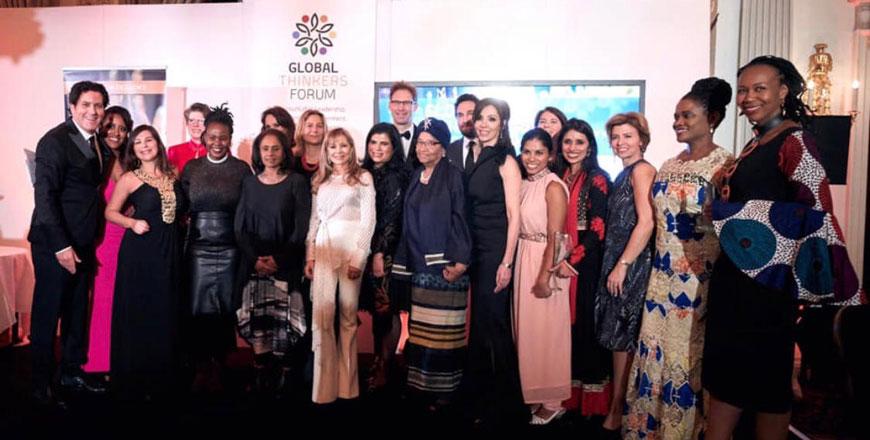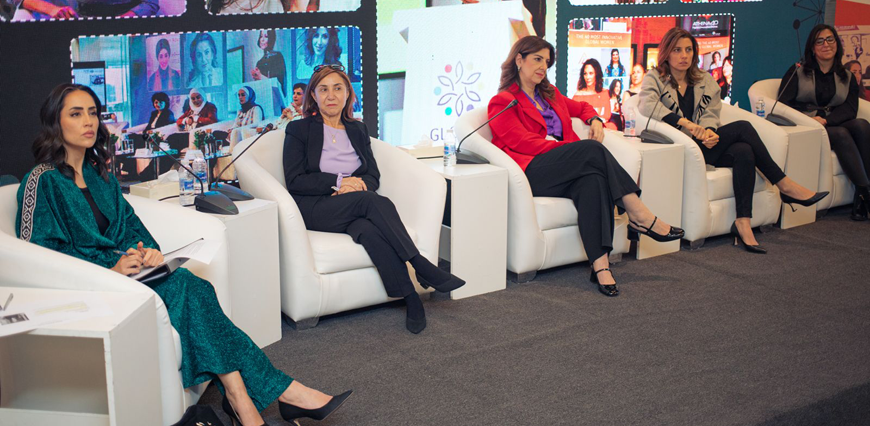You are here
Stakeholders discuss ‘case on female leadership’ in Amman as part of global conversation
By Balqis Zeidan - Mar 03,2020 - Last updated at Mar 03,2020
AMMAN — INJAZ Business Incubator “mySTARTUP” hosted the 2nd Athena40 Global Conversation on Monday under the title “The Case on Female Leadership” with the aim of empowering and inspiring women around the globe.
The event also promoted aspects of entrepreneurial thinking and encouraged women to value and embrace them, according to organisers.
The Athena40 Global Conversation, launched by the Global Thinkers Forum, was held simultaneously in six cities on five continents. Amman’s discussion was supported by the Dutch embassy in Amman and the Canadian Government through the Launching Economic Achievement Programme for Women in Jordan.
At the event, Dutch Ambassador to Jordan Barbara Joziasse discussed the challenges facing women in the Netherlands and their forward progress in terms of leadership.
She highlighted the influence of families on women’s empowerment, stressing that girls should be encouraged to believe in themselves and their right to flourish in the early stages of life.
Joziasse also underscored the role that males play in empowering women, starting with fathers supporting their young daughters.
For her part, Canadian Ambassador to Jordan Donica Pottie said that women “should not expect to be handed” leadership roles, but that they should instead “push for them”.
Women should support other women and older women ought to mentor younger ones, she added.
Shedding light on the effects of violence, Pottie said that “women who have taken the step of standing up and calling out sexual and gender-based violence should be commended”.
Noting the distinction between female and feminist leadership, Pottie said that women and men “should be allies and equally included in the decision-making processes”, as feminists do not aspire to reduce men’s opportunities but seek for everyone to have a “fair shot”.
The event was also attended by the British Ambassador to Jordan Edward Oakden, and included a panel discussion moderated by Barrister and Social Entrepreneur Mary Nazzal, who discussed challenges facing women in the Kingdom in different sectors with five female leaders in Jordan.
Five other panel discussions were held simultaneously in Beirut, Johannesburg, Istanbul, Karachi and London. Round-robin discussions were moderated from London by Tim Willcox from the BBC World through live broadcasting.
During the discussion in Amman, former minister of Social Development and former Senator Hala Lattouf said: “When it comes to women’s rights, there are many issues to celebrate." Nevertheless, she added that 10 years back she “thought women would be further forward today” in their journey of women’s empowerment.
In the Global Gender Gap Index, Jordan ranked 138th out of 153 countries, she said, attributing this ranking to economic and political causes.
MP Wafa Bani Mustafa said that Jordanian laws support women’s participation in politics, noting that Parliament witnessed the participation of one woman in 1993, whereas 20 women are engaged in Parliament today at a 15.4 per cent participation rate.
While encouraging the quota system to be applied to all decision-making processes in Jordan, the MP said that women have only 15 seats in Parliament.
Bani Mustafa noted that the Kingdom has never had a female prime minister, speaker of the House, or Sharia or Constitutional Court leader.
Demonstrating the impact of women’s economic participation on the gross domestic product (GDP), Bank Al Etihad CEO Nadia Saeed said that GDP could increase by 5 per cent if Jordanian women’s participation in the economy reached the MENA average or Jordan’s 2025 goals.
Only 22 per cent of institutional boards in Jordan have female representation, of which 81 per cent have only one female board member, 14 per cent have two female board members and 2 per cent have three, she said.
She expressed her satisfaction with the improvements made to the labour and social security laws and with the launch of the national strategy and the action plan for women in Parliament.
“Women are born empowered, yet the education system and the ecosystem are disempowering them,” Senator Haifa Najjar said during the discussion.
Everyone, she said, agrees on democracy, women’s participation and women’s empowerment on the cognitive level, however “on the behavioural level, people don’t tackle challenges like corruption, discrimination and harassment”.
Young entrepreneur Lina Abojaradeh said that women’s empowerment is not limited to enabling their participation in the workforce, but extends to providing them with opportunities to create jobs.
“I don’t believe we find our dream jobs, we make them instead,” she said.
Related Articles
AMMAN — The 4th Athena40 Global Thinkers Forum on Tuesday kicked off bringing together 50 leading women influencers from all across the worl
AMMAN — HRH Princess Sumaya, president of the Royal Scientific Society, was a special guest and closing speaker at the sixth Global Thinkers
AMMAN — Although Jordan has one of the highest numbers of female school and university graduates, it has one of the lowest levels of female



















